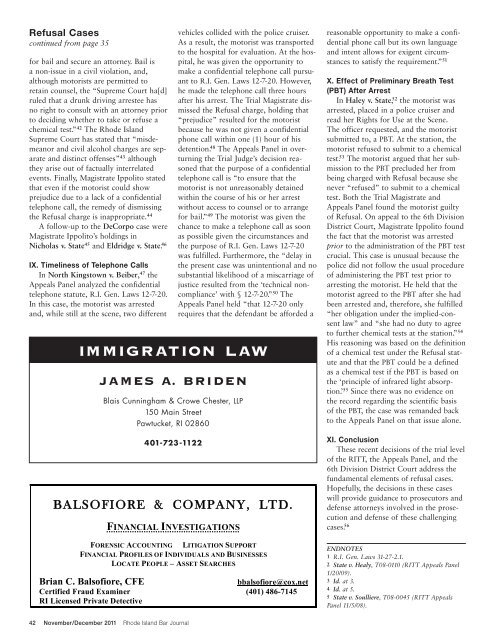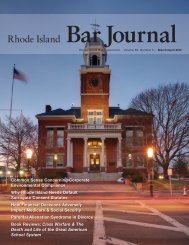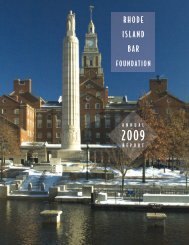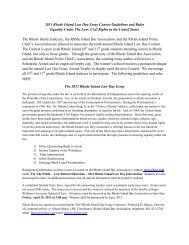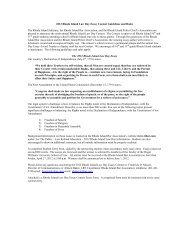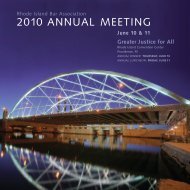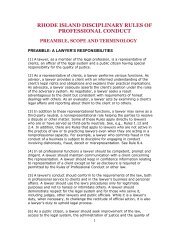Are We Taking The Sex Offender Label Too Far? - Rhode Island Bar ...
Are We Taking The Sex Offender Label Too Far? - Rhode Island Bar ...
Are We Taking The Sex Offender Label Too Far? - Rhode Island Bar ...
Create successful ePaper yourself
Turn your PDF publications into a flip-book with our unique Google optimized e-Paper software.
Refusal Cases<br />
continued from page 35<br />
for bail and secure an attorney. Bail is<br />
a non-issue in a civil violation, and,<br />
although motorists are permitted to<br />
retain counsel, the “Supreme Court ha[d]<br />
ruled that a drunk driving arrestee has<br />
no right to consult with an attorney prior<br />
to deciding whether to take or refuse a<br />
chemical test.” 42 <strong>The</strong> <strong>Rhode</strong> <strong>Island</strong><br />
Supreme Court has stated that “misdemeanor<br />
and civil alcohol charges are separate<br />
and distinct offenses” 43 although<br />
they arise out of factually interrelated<br />
events. Finally, Magistrate Ippolito stated<br />
that even if the motorist could show<br />
prejudice due to a lack of a confidential<br />
telephone call, the remedy of dismissing<br />
the Refusal charge is inappropriate. 44<br />
A follow-up to the DeCorpo case were<br />
Magistrate Ippolito’s holdings in<br />
Nicholas v. State 45 and Eldridge v. State. 46<br />
IX. Timeliness of Telephone Calls<br />
In North Kingstown v. Beiber, 47 the<br />
Appeals Panel analyzed the confidential<br />
telephone statute, R.I. Gen. Laws 12-7-20.<br />
In this case, the motorist was arrested<br />
and, while still at the scene, two different<br />
vehicles collided with the police cruiser.<br />
As a result, the motorist was transported<br />
to the hospital for evaluation. At the hospital,<br />
he was given the opportunity to<br />
make a confidential telephone call pursuant<br />
to R.I. Gen. Laws 12-7-20. However,<br />
he made the telephone call three hours<br />
after his arrest. <strong>The</strong> Trial Magistrate dismissed<br />
the Refusal charge, holding that<br />
“prejudice” resulted for the motorist<br />
because he was not given a confidential<br />
phone call within one (1) hour of his<br />
detention. 48 <strong>The</strong> Appeals Panel in overturning<br />
the Trial Judge’s decision reasoned<br />
that the purpose of a confidential<br />
telephone call is “to ensure that the<br />
motorist is not unreasonably detained<br />
within the course of his or her arrest<br />
without access to counsel or to arrange<br />
for bail.” 49 <strong>The</strong> motorist was given the<br />
chance to make a telephone call as soon<br />
as possible given the circumstances and<br />
the purpose of R.I. Gen. Laws 12-7-20<br />
was fulfilled. Furthermore, the “delay in<br />
the present case was unintentional and no<br />
substantial likelihood of a miscarriage of<br />
justice resulted from the ‘technical noncompliance’<br />
with § 12-7-20.” 50 <strong>The</strong><br />
Appeals Panel held “that 12-7-20 only<br />
requires that the defendant be afforded a<br />
IMMIGRATION LAW<br />
JAMES A. BRIDEN<br />
Blais Cunningham & Crowe Chester, LLP<br />
150 Main Street<br />
Pawtucket, RI 02860<br />
401-723-1122<br />
BALSOFIORE & COMPANY, LTD.<br />
FINANCIAL INVESTIGATIONS<br />
FORENSIC ACCOUNTING LITIGATION SUPPORT<br />
FINANCIAL PROFILES OF INDIVIDUALS AND BUSINESSES<br />
LOCATE PEOPLE – ASSET SEARCHES<br />
Brian C. Balsofiore, CFE<br />
bbalsofiore@cox.net<br />
Certified Fraud Examiner (401) 486-7145<br />
RI Licensed Private Detective<br />
reasonable opportunity to make a confidential<br />
phone call but its own language<br />
and intent allows for exigent circumstances<br />
to satisfy the requirement.” 51<br />
X. Effect of Preliminary Breath Test<br />
(PBT) After Arrest<br />
In Haley v. State, 52 the motorist was<br />
arrested, placed in a police cruiser and<br />
read her Rights for Use at the Scene.<br />
<strong>The</strong> officer requested, and the motorist<br />
submitted to, a PBT. At the station, the<br />
motorist refused to submit to a chemical<br />
test. 53 <strong>The</strong> motorist argued that her submission<br />
to the PBT precluded her from<br />
being charged with Refusal because she<br />
never “refused” to submit to a chemical<br />
test. Both the Trial Magistrate and<br />
Appeals Panel found the motorist guilty<br />
of Refusal. On appeal to the 6th Division<br />
District Court, Magistrate Ippolito found<br />
the fact that the motorist was arrested<br />
prior to the administration of the PBT test<br />
crucial. This case is unusual because the<br />
police did not follow the usual procedure<br />
of administering the PBT test prior to<br />
arresting the motorist. He held that the<br />
motorist agreed to the PBT after she had<br />
been arrested and, therefore, she fulfilled<br />
“her obligation under the implied-consent<br />
law” and “she had no duty to agree<br />
to further chemical tests at the station.” 54<br />
His reasoning was based on the definition<br />
of a chemical test under the Refusal statute<br />
and that the PBT could be a defined<br />
as a chemical test if the PBT is based on<br />
the ‘principle of infrared light absorption.’<br />
55 Since there was no evidence on<br />
the record regarding the scientific basis<br />
of the PBT, the case was remanded back<br />
to the Appeals Panel on that issue alone.<br />
XI. Conclusion<br />
<strong>The</strong>se recent decisions of the trial level<br />
of the RITT, the Appeals Panel, and the<br />
6th Division District Court address the<br />
fundamental elements of refusal cases.<br />
Hopefully, the decisions in these cases<br />
will provide guidance to prosecutors and<br />
defense attorneys involved in the prosecution<br />
and defense of these challenging<br />
cases. 56<br />
ENDNOTES<br />
1 R.I. Gen. Laws 31-27-2.1.<br />
2 State v. Healy, T08-0110 (RITT Appeals Panel<br />
1/20/09).<br />
3 Id. at 3.<br />
4 Id. at 5.<br />
5 State v. Soulliere, T08-0045 (RITT Appeals<br />
Panel 11/5/08).<br />
42 November/December 2011 <strong>Rhode</strong> <strong>Island</strong> <strong>Bar</strong> Journal


